| Srl | Item |
| 1 |
ID:
073522
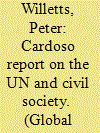

|
|
|
|
|
| Publication |
2006.
|
| Summary/Abstract |
The Report of the Panel of Eminent Persons on United Nations-Civil Society Relations was published in June 2004. It strongly endorsed the case for wider participation of civil society in all aspects of the UN's work, both at the headquarters and at the country level. However, the panel members displayed little understanding of the existing NGO consultative arrangements. Many of its recommendations were impolitic or impractical. The report was intellectually incoherent because it embodied three competing theoretical frameworks: functionalism, neocorporatism, and democratic pluralism. The functionalist emphasis on expertise and the neocorporatist emphasis on engaging stakeholders cannot offer criteria for participation on an all-embracing democratic basis. Reform is needed to provide facilities and resources to enhance participation by marginalized groups.
|
|
|
|
|
|
|
|
|
|
|
|
|
|
|
|
| 2 |
ID:
073521
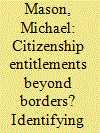

|
|
|
|
|
| Publication |
2006.
|
| Summary/Abstract |
argue that although environmental law is state centric in nature, there is a growing body of international environmental law that allows at least some input from public actors in implementing key substantive and procedural obligations. The evolution of these environmental entitlements is linked to the global diffusion of democratic norms of civic participation, the application of the nondiscrimination principle in both public and private international law, and the cosmopolitan reach of human rights claims. It is at the intersection of individual and nongovernmental organization (NGO) rights with interstate obligations that transnational citizenship entitlements are emerging¾notably equal opportunities for access and redress for affected publics. I critically survey relevant multilateral environmental agreements to gauge the significance of rule making bestowing entitlements on publics affected by transboundary and global environmental harm.
|
|
|
|
|
|
|
|
|
|
|
|
|
|
|
|
| 3 |
ID:
073518
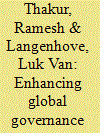

|
|
|
| 4 |
ID:
073520
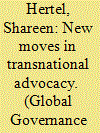

|
|
|
|
|
| Publication |
2006.
|
| Summary/Abstract |
Activists involved in human rights advocacy across borders may share common interests in changing the status quo¾but they do not always agree on the rights centrally at issue, nor the best strategy for promoting and protecting them. This is particularly true in campaigns in which "economic rights" claims emerge. Two new mechanisms I develop in this article shed light on the complexities of transnational advocacy and norms evolution. Two case studies offer insights into the operationalization of the mechanisms: a campaign to prevent child labor inBangladesh, and a campaign to prevent employment discrimination against pregnant workers in Mexico.
|
|
|
|
|
|
|
|
|
|
|
|
|
|
|
|
| 5 |
ID:
073519


|
|
|
|
|
| Publication |
2006.
|
| Summary/Abstract |
In this article, we examine two possibly competing hypotheses on the origins of global civil society. The first suggests that global civil society has developed rationally over a long period of time, continuous with the development of domestic civil society in democracies. The second postulates that global civil society is a relatively new phenomenon, one that has emerged to respond to unprecedented challenges to democracy as a result of globalization. Drawing on a case study of global politics surrounding plant biotechnology, we evaluate these two hypotheses. Our findings support the second, more institutionalist, possibility. We then use these findings to comment on how global civil society might be defined and how it relates to democracy.
|
|
|
|
|
|
|
|
|
|
|
|
|
|
|
|
| 6 |
ID:
073517
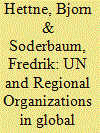

|
|
|
| 7 |
ID:
073523


|
|
|
|
|
| Publication |
2006.
|
| Summary/Abstract |
In this article, I review the first seven volumes of an unprecedented history of ideas and the UN. This fascinating history covers oral interviews with key personalities as well as volumes on economic history, statistics, the regional commissions, and gender. Even at its midpoint, the project already presents conclusions of importance to reforming the UN so that it can play a stronger intellectual role. Indeed, the series attests to the UN's soft power in creating and fostering ideas that have shaped the world.
|
|
|
|
|
|
|
|
|
|
|
|
|
|
|
|